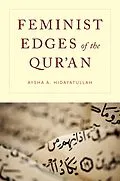Aysha Hidayatullah presents the first comprehensive analysis of contemporary feminist interpretations of the Qur'an. Synthesizing prominent feminist readings of the Qur'an in the United States since the late twentieth century, she provides an essential introduction to this nascent field of Qur'anic scholarship and engages in a deep investigation-as well as a radical critique-of its methods and approaches. With a particular focus on feminist "impasses" in the Qur'anic text, she argues that many feminist interpretations rely on claims about feminist justice that are not fully supported by the text, and she proposes a major revision to their exegetical foundations. A provocative work of Muslim feminist theology, Feminist Edges of the Qur'an is a vital intervention in urgent conversations about women and the Qur'an.
Autorentext
Aysha A. Hidayatullah is Assistant Professor in the Department of Theology and Religious Studies at the University of San Francisco, a Jesuit Catholic institution where she teaches courses on Islam, gender, and race.
Inhalt
Preface Acknowledgements Introduction Part I: Historical Emergence of Feminist Qur'anic Interpretation Chapter 1: History of Tafsir Chapter 2: The Frames of Feminism Chapter 3: Relationships to Co-Religionists and the State Part II: Three Interpretive Methods of Feminist Qur'anic Interpretation Chapter 4: Historical Contextualization Method Chapter 5: Intra-Textual Method Chapter 6: The Tawhidic Paradigm Part III: Critiques of Feminist Qur'anic Interpretation Chapter 7: Initial Conclusions Chapter 8: A Critical Reassessment Chapter 9: Confronting Feminist Edges Appendix of Qur'anic Verses Notes Bibliography
